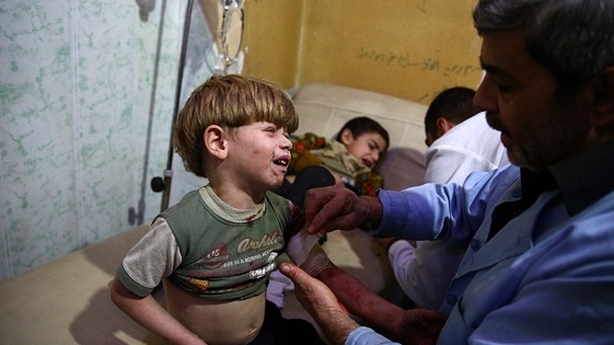The United States, Russia, Iran and 14 other powers have called for a nationwide truce in Syria's four-year civil war after attending talks in Vienna.
The powers have also called for a renewal of stalled United Nations-brokered talks between the government and opposition and fresh elections.
In a joint statement, the participants said "substantial differences remain", though they agreed it was "imperative to accelerate all diplomatic efforts to end the war".
The participants' statement said they were asking the UN to bring together representatives of the Syrian government and opposition to launch "a political process leading to credible, inclusive, non-sectarian governance, followed by a new constitution and elections".
Earlier, the US said it will deploy special forces to northern Syria in an advisory role.
US President Barack Obama "has authorised a small complement, fewer than 50", of US Special Operations Forces to deploy to northern Syria, where they will help coordinate local ground forces and coalition efforts to counter ISIL," said a senior administration official, referring to the so-called Islamic State group.
Talks over the Syrian conflict took place place as at least 89 people, including 17 children, were killed in attacks on Syrian opposition strongholds near Damascus and in the country's north, according to a British-based monitoring group.
The Syrian Observatory for Human Rights said regime rocket fire on the rebel-controlled town of Douma left 57 people dead, among them five children.
A further 32 civilians, including 12 children, were killed in air strikes believed to have been carried out by regime or Russian warplanes on opposition-held areas of Aleppo city, the Observatory said.

The key international players in the conflict remain bitterly divided over the question of President Bashar al-Assad and met in Vienna to discuss the issue.
On one side, Russia and Iran are backing Mr Assad's forces on the ground and say Syria must be helped to defeat "terrorism" before a political process can take shape.
On the other side, the US and its key regional allies Turkey and Saudi Arabia are supporting groups fighting Mr Assad and insist he must step down in favour of a unity government.
At today's talks, Iran signalled that it favoured a six-month "transition" period in Syria followed by elections to decide the fate of Mr Assad, an apparent concession ahead of the first peace conference Iran was permitted to attend.
"Iran does not insist on keeping Assad in power forever," Iranian Deputy Foreign Minister Amir Abdollahian, a member of the delegation at the talks, said.
"Talks are all about compromises and Iran is ready to make a compromise by accepting Mr Assad remaining for six months," the official told Reuters. "Of course, it will be up to the Syrian people to decide about the country's fate."
Four weeks after Russia tipped the balance of power on the battlefield back towards Mr Assad's government by launching a campaign of air strikes against his enemies, Iranian officials were invited to attend an international peace conference for the first time.
French Foreign Minister Laurent Fabius has said the powers will meet again in two weeks for another round of talks.
Mr Fabius said "there are points of disagreement, but we advanced enough for us to meet again, in the same configuration, in two weeks".
Diplomatic solution
All previous efforts to find a diplomatic solution to Syria's civil war have collapsed over the insistence of the United States, European powers, Arab states and Turkey that Mr Assad agree to leave power.
In August, 117 people were killed in a single day of air strikes in Douma, causing a global outcry.
Throughout Syria's brutal war, both the government and opposition forces have been criticised by rights groups for indiscriminate fire on civilian areas.
More than 250,000 people have been killed since the conflict began in March 2011.
Meanwhile, UN Secretary General Ban Ki-moon has urged participants at the talks to show "flexibility".
He also welcomed Iran's participation for the first time in the discussions.
Iranian Foreign Minister Javad Zarif is joining key players in the Syria crisis - including Russia, the United States and Saudi Arabia - in Vienna for a renewed effort to end more than four years of bloodshed.
It is the first time all the major players in the conflict are in the same room, though there has been no mention of either the Syrian government or the opposition attending.
The UN chief told a news conference in Madrid he was "encouraged" that high-level leaders are meeting in Vienna.
He said: "My sincere hope is that they will really address this issue with a sense of flexibility, whatever differences they may have in their political views, in their approaches. They should be united."

